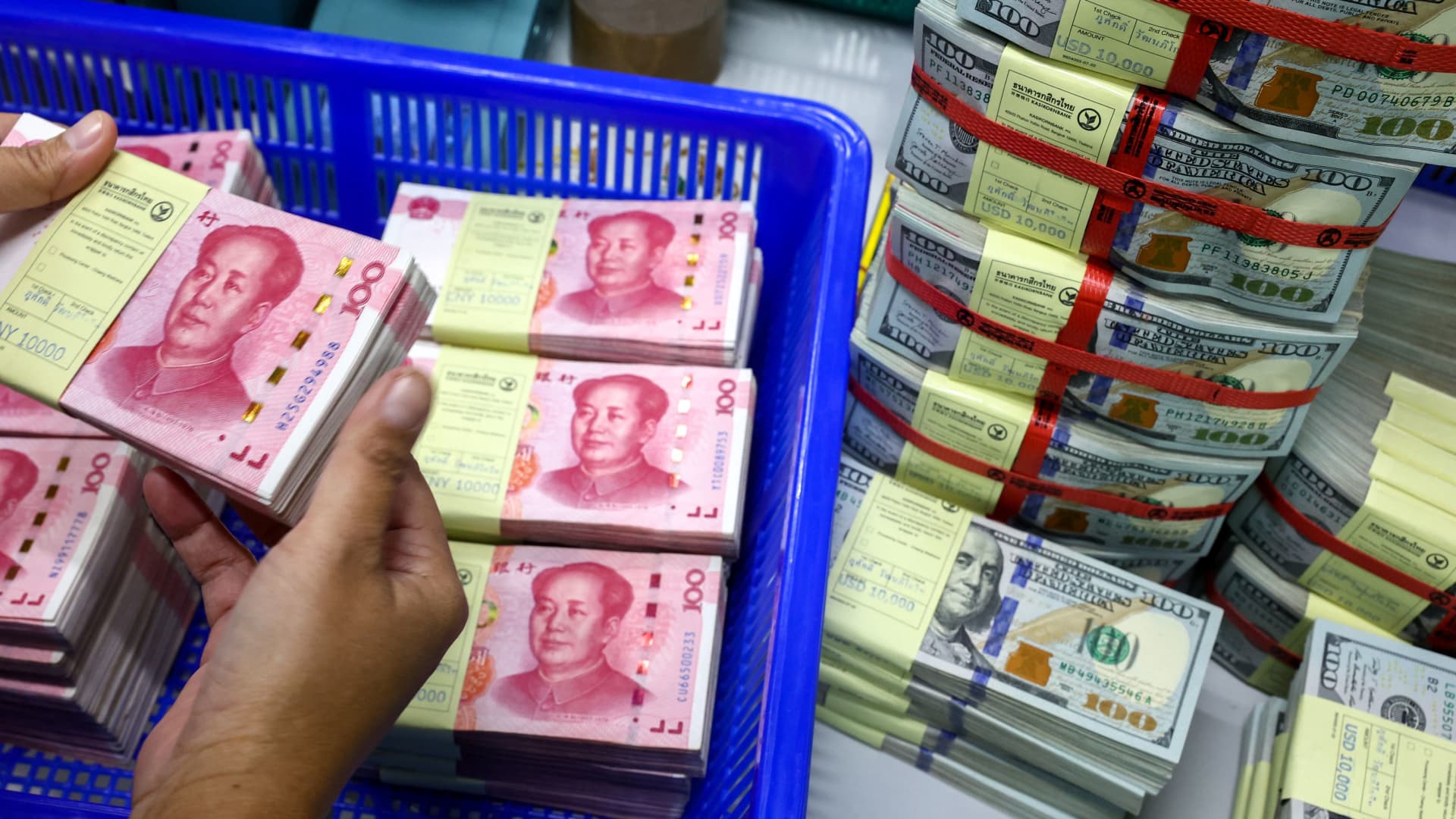A bank employee count Chinaâs renminbi (RMB) or yuan notes next to U.S. dollar notes at a Kasikornbank in Bangkok, Thailand, January 26, 2023.
Athit Perawongmetha | Reuters
DALIAN, China â For China’s yuan to be used more globally, the currency needs more “applications” such as for stocks and bonds, Bonnie Chan, CEO of Hong Kong Exchanges and Clearing Limited, said on a panel Tuesday.
Beijing has long touted its ambitions for increasing global use of the Chinese yuan â also known as the “renminbi” or “RMB” â in an international financial market where the U.S. dollar is the dominant currency. U.S. sanctions on Russia have also increased the pressure on some countries to have alternatives to the greenback.
Chan, speaking during the World Economic Forum’s “Summer Davos” meeting in Dalian, China, noted that people hold a currency for trade, or, more importantly, as a store of wealth.
“We’re not just going to hold on to a bunch of RMB and put it into this bank account,” she said. “You want to have bonds, you want to have equities, etc.”
“One of our strategic imperatives [has] been changed to make sure that we continue to produce more RMB-denominated security products,” Chan said, “so that investors around the world can actually see more applications of the RMB and be able to use those as the medium to store wealth in the form of the RMB.”

Last year, the HKEX announced a “Dual-Counter” program that allows investors to trade Hong Kong-listed securities in Hong Kong dollars or Chinese yuan.
In a significant step toward internationalization of the yuan, the International Monetary Fund in 2015 announced that it would add the yuan to its basket of reserve currencies the following year.
The yuan was the fourth-most active currency for global payments by value in May, accounting for nearly 4.5% of such transactions, according to the interbank messaging network SWIFT. The U.S. dollar had a nearly 48% share.
In trade finance, the yuan ranked third at about 5.1% in May, according to SWIFT. The euro was slightly higher at 5.6%, while the U.S. dollar dominated with a nearly 85% share, the data showed.
Fred Hu, founder, chairman and CEO of Primavera Capital, said on the same panel Tuesday that the internationalization of the yuan is probably going to take longer than many expect, despite an increased amount of statements from Beijing.
While China is the largest trading nation and has large financial centers, “we’re not as big, as deep as the U.S.,” Hu said. “Besides our capital account is also closed, it’s not fully convertible, [which] also in some way [is] hampering the internationalization of the renminbi.”
A maturing financial market
Developing more Chinese yuan-denominated investment products also requires a maturation of the local financial sector. Part of that includes having a more sophisticated investor base.
Chan said that during the annual Lujiazui Financial Forum in Shanghai last week, nearly every conversation with top leaders included the term “patient investing.”
The phrase has emerged in official releases to encourage long-term investing over short-term speculation.
“Patience comes from learning through the market volatility,” Kenny Lam, CEO of Two Sigma Asia-Pacific, said during the same panel on Tuesday.
He said that policymakers have been giving more thought to making their policies more stable and consistent.
Waiting for more Chinese IPOs
Chinese companies have long sought to tap U.S. financial markets for the prestige and greater market liquidity they offer, but increased regulatory scrutiny by both Beijing and Washington, D.C., has drastically slowed such listings in the last three years.
“I think IPOs are essential for attracting investors to come back in the market. All of the storytelling around it, it shows that there’s a lot of progress happening,” Jonathan Krane, the founder and CEO of KraneShares, also said on the panel on Tuesday.
“In the U.S. we see all this innovation, AI and all these companies going public and doing well, and then in China, the same industry, same innovations happen and those stories should be told through the IPO market,” Krane said, noting he is hearing that the IPO market “is going to start coming back.”
Chinese authorities last week announced a new effort to support initial public offerings, especially in Hong Kong.
Chan said so far this year the Hong Kong exchange has received 73 new listing applications â a 50% increase versus the second half of last year, she said. “The pipeline is building up nicely,” she said, noting about 110 IPOs in total are in line. “All we need is a set of good market conditions so these things get to launch and price nicely,” she added.
Read the original article here
